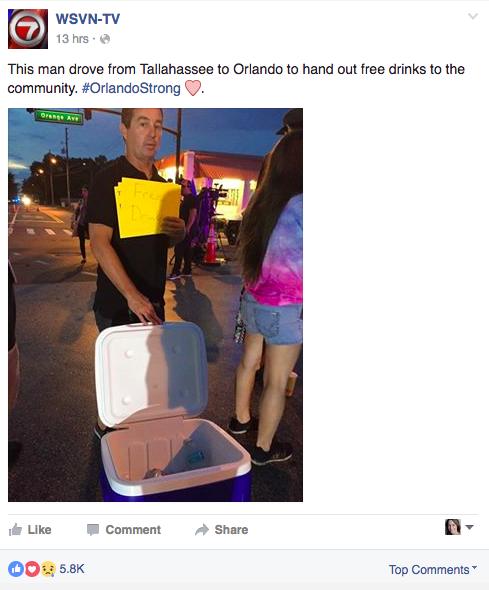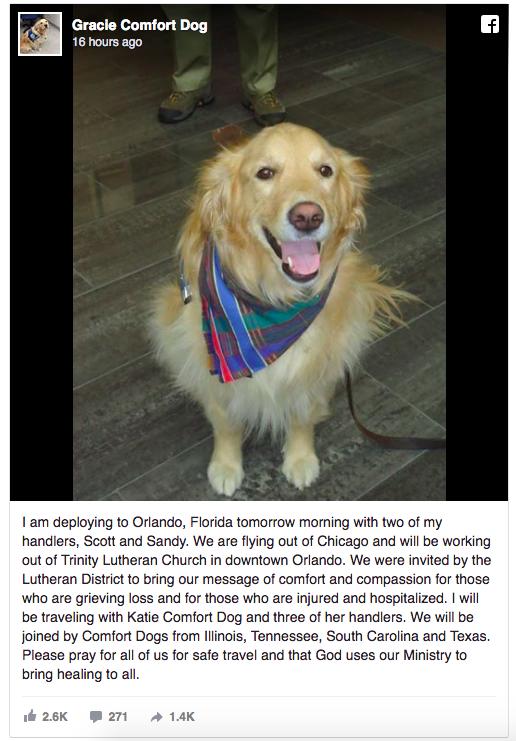
This article is more than
9 year old“Don’t worry, I got you,” club-goer Josh McGill, himself escaping the scene of violence inside, replied before peeling off his shirt to stop the rush of blood, engulfing the wounded man in a bear hug, and keeping him conscious as they drove to the nearest ER, according to the LA Times. The man, Rodney Sumter Jr., is now recovering, largely in part to McGill’s brave efforts.
Josh McGill describes his life-saving actions in the aftermath of the shooting at Pulse nightclub in Orlando. (Video: CBS)
The country awoke on Sunday, June 12, to news of the most devastating mass shooting in American history, with 49 dead and 53 wounded. Painful details of what happened during the massacre at Pulse are still emerging, yet so are stories of kindness, bravery, and selflessness.
Another man packed a cooler, jumped in his car and drove for nearly four hours f-rom Tallahassee to Orlando to pass out free drinks to the reeling community. Miami television station WSVN-TV Channel 7 captured the unidentified man, standing over his half-empty cooler, in a Facebook post,

Photo: Facebook
Gracie the Comfort Dog, a Chicago pup who brings comfort and compassion to the suffering, was immediately put on a flight to Orlando on Sunday morning.
Gracie is no stranger to national tragedies; she deployed to Newtown, Conn., in 2012 to comfort members of the community after 26 were killed at Sandy Hook Elementary School.

Photo: Facebook
By Monday afternoon, just over a day after the shooting, $2.1 million had been raised to help victims and their families through the GoFundMe platform. Some 600 people at a time have lined up to donate blood in Orlando. Counselors have offered their services pro bono, even via phone or Skype.
People across the nation lined up in droves to donate blood after the shooting at Pulse. (Video: ABC)
Humans are hardwired to cre-ate actions that lead to our own preservation, says Karla Ivankovich, PhD, a professor of psychology at the University of Illinois, Springfield. “Emotions spur these acts,” she tells Yahoo Beauty. “Whether the initial emotion is hope or hopelessness, we attempt to be proactive in good times and reactive in difficult times.”
Ivankovich says traumas often cause us to imagine what it would be like to be faced with the difficulties of the victims. Helpers frequently react in ways they’d hope others would if the tables were turned and they were in dire straits. “We feel an intense kinship and desire to protect others, especially because, at some point, you realize that this could have been you, your family, one of your friends, and the hurt and loss settle in,” she explains.
Related: 7 Things Kind People Do That Make Us Love Them
The effects of tragedy also cut a layer deeper. According to Art Markman, PhD, a professor of psychology at the University of Texas, Austin, there is another reason we see so many random acts of kindness in the wake of extreme tragedy. “There is a lot of work in psychology on what is called ‘terror management theory,’” he tells Yahoo Beauty. “The idea is that humans are probably the only animals on the planet that can contemplate their own mortality. As a result, humans have to deal with the fear that someday we will die.”
Markman says that when confronted with our mortality, we engage with this fact in ways that help us cope with that existential fear. “One in particular is to bind ourselves more closely to other members of our broader social group,” he explains. “The idea is that our culture, our ‘people,’ will live on beyond us, and so we increase our affiliation with our social groups. These random acts of kindness are a way to feel closer to other members of society in times of crisis.”
In certain ways, tragedies help erase the boundary lines that divide us all, Markman says. “We often define our social group more broadly in times of crisis than in normal times,” he says. “Ordinarily, people in California, Texas, or New York might think of Floridians as being socially distant f-rom them. Similarly, members of the straight community might feel social distance f-rom the LGBT community. But, following a crisis like the one in Florida, people across the country were thinking of themselves as Americans — a group that is inclusive — rather than maintaining this social distance.”
Markman says feelings stirred after Orlando are similar to ones many Americans felt for the people of France in the wake of the C-harlie Hebdo shootings. Instead of defining ourselves in a million unique and different ways, in times of crisis, tragedy simply makes us human.
And small moments of humanity and kindness restore our faith in the people around us. This is is an instinctual response, says Ivankovich, which provides a sense of balance amid horrific catastrophe. “There is so much death and mayhem that people are searching for hope — and that means we have to be a part of the solution, not the problem,” Ivankovich says. “That’s why people do random, wonderful things.”
Nothing can erase the pain of 50 lost lives and 53 wounded on Sunday, but small, amazing acts of kindness are an instinctual bonding mechanism of the human race.
Let’s keep in touch! Follow Yahoo Beauty on Facebook, Twitter, Instagram, andPinterest.